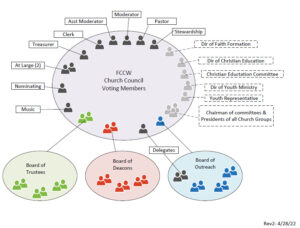Align how we make ministry happen with our current needs and realities by improving our church governance,
SO THAT:
- Church leaders and congregants spend more time devoted to mission and ministry, and less time working on organization and administration;
- The decision-making processes are clear, transparent, simplified, and collaborative;

Ministry teams are better integrated within the overall mission of the Church and not working as isolated groups; - Fewer leadership positions require multi-year commitments.
We seek to remain God-centered in our organization so that we may embody the love of Christ in the world.
We acknowledge that change is challenging but it is also an opportunity. It is normal to have feelings of loss, doubt, and discomfort but by keeping positive and talking to each other about our wants and needs, we will make small steps and reach a model of governance that works for us – one that allows us to focus on our mission and values and to engage in ministries that bring each of us joy and in a closer walk with our God. We want to hear from you so please contact us with any questions or comments you have as we go forward. Stay tuned, there is much more to come!
Principles of Governance
As we review examples from others consistent themes that have emerged are: intentional focus on governance and the implementation of a unified governing board.
A Governing Board model:
- Stewards the mission to which God calls the church;
- Makes policy, not decisions;
- Exercises visionary and fiduciary oversight of church resources;
- Engages in strategic planning and regular evaluation; and
- Tends to the overall well-being of the church.
THROUGH ITS POLICIES, THE GOVERNING BOARD:
- Delegates to ministry teams the authority, power, and resources to carry out the work of the church; and
- Partners with ministry leaders.
All leaders practice transparent decision-making, healthy conflict management, and mutual support.
Frequently Asked Questions
Is the Restructuring Team making a recommendation that we change the structure of our current way of governing, and if so why?
Yes we do feel that it is time for FCCW to make a change for these reasons:
We no longer are a “big” church. From 1980 to the current time, our attendance has gone from an average Sunday attendance of 150 to 40;
Our current governance structure calls for 30 elected positions (not including the pastor), and when committees are added in, it is 82 positions in all.
Largely due to this structure we spend more time on administration and organization than we do on ministry;
Leadership positions require too many multi-year commitments;
Decision making process needs to be simplified, transparent and collaborative.
Has a new structure of governance been decided upon?
No. We do believe that a single-board type of governance may be the best for our church but no decision has been made. We are looking at several models that are being used in various congregations and will be outlining these to Council in July and August. We will then be in conversation with you so that together we can choose what kind of model is best for FCCW.
What are the next steps for our team?
Using the various models we have been studying, we are drafting a template that will enumerate components of a single board governance, such as the purpose, guiding principles, functions, roles of the board and other items. We are hopeful that we will have this draft by June 30th.

